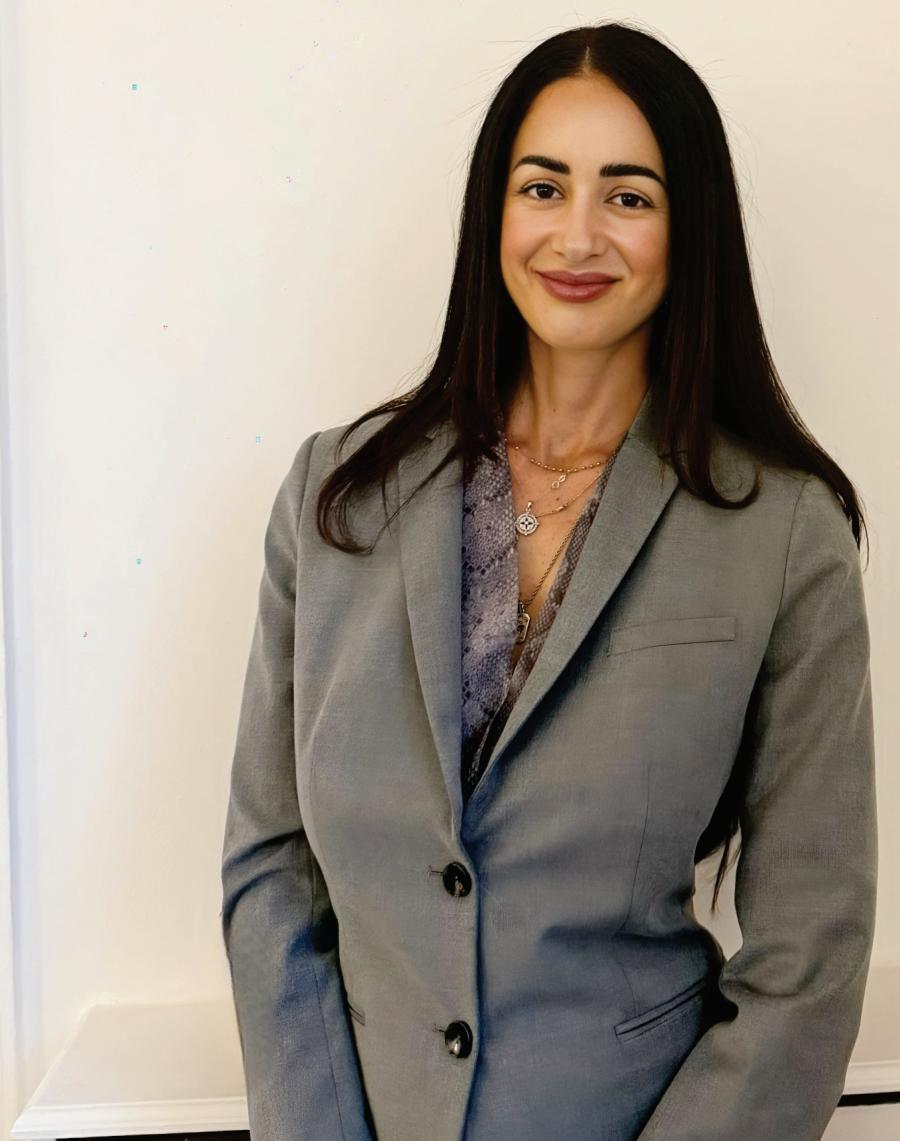
















Aswestandatthethresholdofaneweradefinedbyrapidtechnologicaladvancement,
shiftingglobaleconomies,andarenewedfocusoninclusivity,leadershipisbeing reimagined. In this context, the role of women leaders has emerged not just as a matterofrepresentationbutasapowerfulforceshapingindustries,inspiringcommunities, and transforming societies at large. It is with great pride that we present “The Most EmpoweringWomenLeaderstoWatchin2025.”
This special feature is dedicated to exceptional women who are breaking barriers, challenging conventional norms, and redefining success in their respective fields. From pioneering innovations in technology and finance to leading social enterprises that drive positive impact, these remarkable leaders exemplify resilience, vision, and purpose-driven leadership.
Our curation celebrates diversity across industries, geographies, and backgrounds— showcasing women whose achievements reflect not only personal success but a deep commitment to driving systemic change. Each profile tells a unique story of overcoming adversity, leading with empathy, and inspiring the next generation of trailblazers.Whether they are revolutionizing sustainable practices, spearheading digital transformation, or advocating for inclusive governance, their work stands as a testament to the power of visionaryleadership.
In assembling this distinguished list, we sought individuals who are not only shaping the futureofbusinessbutarealsocatalystsforsocialprogress.Theseleadersrepresentadynamic shift toward more equitable workplaces, where innovation is matched by integrity, and ambition is balanced by social responsibility. Their ability to navigate complexity with clarity,andleadwithbothstrengthandcompassion,offersvaluablelessonsforprofessionals acrossindustries.
Atatimewhenthegloballandscapefacesunprecedentedchallengesandopportunities,the needforempoweredleadershiphasneverbeengreater Thesewomenleadersexemplifyhow bold ideas, ethical practices, and a relentless pursuit of excellence can drive meaningful, lastingchange.
Wehopetheirstoriesserveasasourceofinspirationandempowerment—motivatingreaders toembraceleadershipinallitsformsandtoadvocateforamoreinclusive,innovative,and sustainablefuture.
Leading Through Transition: Jessica Lust Cultivates Career Growth from Dynamic Environments
T H E S T O R I E S W I T H I N
18.
Elbia Gannoum From Small-Town Dreams to Global Impact
26. Federica Maiorano
Transforming the Maritime Tech Landscape with Innovation and Dedication
30. TM A F1 Sporting Events ConnoisseurSonia Irvine Delivering Unrivalled, Tailor-Made Experiences for Both Business and Leisure Clients Worldwide
40. Tina Goulbourne Empowering Growth and Driving Operational Excellence
44. Yael Geffen Footsteps Across Continents
22.
Beyond Inclusion: Cultivating a New Era of Women Centered Leadership
36.
The Boardroom Revolution: How Women are Changing Corporate Culture
Editor-in-Chief
Deputy Editor
Managing Editor
Assistant Editor
Visualizer
Art & Design Head
Art & Design Assitant
Business Development Manager
Business Development Executives
Technical Head
Assitant Technical Head
Digital Marketing Manager
Research Analyst
Circulation Manager
Thanh Truong
Sam Carter
Alaya Brown
Maria Evans
Chris Carter
Millie Simon
Judy Smith
Phoebe Jacob
Aisha, Olivia
David Walker
Mia Rodricks
Helena Smith
Eric Smith
Richard Martinez


Follow us on www.facebook.com/thecioworld We are also available on RNI No.: MAHENG/2018/75953 www.x.com/thecioworld

Copyright © 2025 The CIO World, All rights reserved. The content and images used in this magazine should not be reproduced or transmitted in any form or by any means, electronic, mechanical, photocopying, recording or otherwise, without prior permission from The CIO World. Reprint rights remain solely with The CIO World.
Featuring

Elbia Gannoum CEO ABEEólica abeeolica.org.br
Federica Maiorano CEO Oceanis Tech oceanis.io
Jessica Lust Chief Product Officer Aven�v Technologies aven�v.com
Reema Mahajan Founder
Indian Women in Dubai indianwomenin dubai.org
Sonia Irvine Founder Irvine Consultancy irvineconsultancy.com
Tina Goulbourne Chief Opera�ng Officer Vena Solu�ons venasolu�ons.com
Yael Geffen CEO Lew Geffen Sotheby's Interna�onal Realty sothebysrealty.co.za
Elbia leads ABEEólica’s mission to promote the growth of clean, efficient, and innova�ve wind power solu�ons that contribute to a sustainable energy future.
Federica leads Oceanis Tech’s mission to develop advanced solu�ons that help businesses op�mize opera�ons, reduce environmental impact, and drive smart growth.
Jessica drives the company’s product vision, strategy, and development, ensuring the delivery of innova�ve solu�ons that enhance urban mobility, opera�onal efficiency, and customer experience.
Driven by a mission to empower, connect, and upli�, Reema has built IWD into a vibrant ecosystem that supports thousands of women in their personal, professional, and entrepreneurial journeys.
Known for her strategic insight, collabora�ve leadership, and results-driven mindset, Sonia has helped organiza�ons across sectors enhance performance, build resilient cultures, and unlock long-term success.
Tina is responsible for overseeing global opera�ons while ensuring that Vena’s customers achieve maximum value from their solu�ons.
Yael leads the firm’s mission to offer excep�onal service, global reach, and bespoke solu�ons for discerning property buyers and sellers.

The Front Page























The situation regarding gender inclusion at the workplacehasprogressedconsiderablyoverthepast few decades. Diversity and representation policies haveledtoincreasedaccesstoleadershippositionsbywomen in multiple industries But equity is more than simple inclusiveness It demands a revolutionary change in leadership definitions, practice, and maintenance. And it is here that the concept of women centered leadership must be kept in the forefront, not merely recruiting women into the currentmodel,butchangingthemodeltodrawuponvalues, strategies, and systems shaped by the experiences, insights, andcontributionsofwomen.
Hierarchical, competitive, and individualistic paradigms have traditionally influenced leadership models. These models have largely been developed in fields that are dominatedbymales,whereaggressiveness,domination,and top-downauthorityarevalued.
Women centeredleadership is providing a challengeto such normsandisimposingmorevalueonrelationships,empathy, cooperation, and inclusion. It does not mean that women uniquely possess these qualities, but that they are frequently under-explored and under-appreciated in traditional leadershipmodels.

FromInclusiontoInfluence
Although inclusion to remain in leadership has been greatly focusedonincreasingthepopulationofwomeninleadership, women centered leadership focuses on the importance of womentobuildorganization'sculture,strategy,anddecisionmaking.
Companies dedicated to promoting women centered leadershipshouldnotmerelyrelyondiversitynumbers.This includes reimagining the process of developing leaders, whose voices matter, and what constitutes success. Leadership ratings can be extended, as an example, to
employeewellbeingandlong-termsustainability,community impact,whichareareasthatfemaleleaderswillperformwell in,ratherthanfocusingonprofitmarginsandefficiencyalone.
Initiating a new era of women centered leadership requires culturalandstructuralchange.Thisincludes:
Flexibleworkenvironments:Theemotionalburdenofcare is disproportionately placed on women. Flexible working environments,allowingforworkremotely,andparentalleave policies not only benefit women, but they also serve as a demonstrationofcommitmenttoequality
Mentorship and sponsorship programs: Purposeful mentorship and sponsorship help women become leaders. High-growth potential women find an active sponsor when they receive the backing of senior leaders who can open the rightdoorsandprovideaccesstoessentialopportunities.
Bias training and accountability systems: Organizations mustrespondunconsciousdiscriminationintitling,elevation, andassessment.Visiblesystemsandmeasurescanbeusedto summarizeandcorrectdisparitiesinprogress.
Inclusive decision-making processes: When they help definemajordecisions,notjustasaninput,butalsoasajoint creator, then organizations will have wider perspectives and morecreativeoutputs.
Womencenteredleadershipisbeingwitnessedinanumberof areas in the world. Leaders in government, such as former New Zealand PM Jacinda Ardern, were characterized by compassion, consensus-seeking, and transparency Her style of handling the COVID-19 pandemic attracted global applause and highlighted the success of emotionally competentleadershipwithavalueemphasis.
The companies in the corporate world, such as Patagonia, have introduced women-centric policies like in-house childcare,equalparenthoodleave,andsustainabilitypursued by a woman. These measures have led to the high retention levelsandemployerbrand.
Itisimportanttonotethatwomencenteredleadershipisnot homogeneous. The lives of women are different, depending ontheirrace,class,sexuality,disability,andgeography The intersectional approach is the only approach that will truly transform,asitrecognizesvalueintheseexperiences.
Leadership models that bring marginalized voices to the centeraremostlikelytobefairerandmoreinnovative.Asan example, indigenous leaders, including indigenous women leaders,tendtofocusoncommunitystewardshipandbelongtermthinkers,whichisanessentialcontributiontosocialand environmental sustainability On the same note, Black feminist leadership models emphasize communal care, antioppressionpractices,andcommunityhealing.
A shift in the movement toward gender equity is where influence replaces inclusion. Women centered leadership is not merely a matter of inserting females into already established power structures but redefining the meaning and functioning of leadership. It offers an alternative to supremacy, conversation, hierarchy, to teamwork, and efficiency,tocompassion.Inthisageofglobalcomplexity,in whichwefacedifficultiesonitsbasissuchasclimatechange, social inequality, the concept of inclusion, adaptive and multiculturalleadershipismorerequiredthanever Through women centered leadership, organizations and societies can gain the ability to leave performative inclusion behind in favorofnecessarysystemicchangethatcanbenefitall.


















Asilent, yet momentous revolution has emerged in boardroomsthatwereoncepopulatedwithdarksuits and other familiar faces. Women are no longer waitingtositatthetable;theyareredefiningandredesigning the table. With this increased number of women taking up corporate leadership positions in various companies worldwide,theyhavefoundthemselvesnotjustrelegatedto the dialogue table; they are changing it. Their existence is transformingpriorities,decision-makingprocesses,andmost importantly,thecorporatecultureitself.
ThischangeisnotcontainedinthequotaorPRvictories.Itisa matter of reinventing corporate operations, innovations, and

connection to the surrounding world. The role of women in leadership significantly defines how adaptable and ethical organizationscanbeastheyfacecomplexchallenges,suchas sustainablesolutionsandworkforcediversity.
Historically,itwasconsideredatokenappointmenttoinclude onewomanonaboard.However,truepowerstartswhenthere isacriticalmassofwomenonboards,whichis30%orabove. With this threshold, research has demonstrated that the dynamics of such groups change and that women can now havetheirvoicesheard,greatlyinfluencingconversationand

decision-making This barrier empowers more open, transparent, and stronger versions of corporate culture, as opposedtoonethatshapesitwithhomogenousviews.
EnhancedDecision-MakingandDiversePerspectives
Boardroom gender diversity promotes more thoughtful decisionsthattakeabroaderperspective,andthisthinkingis reasonedandbalanced.Womentendtoembracecollaborative and empathetic styles of leadership, which undermine the normalhierarchicalrules.Thisnotonlymakesconversations moreinterestingbutalsosafeguardsacorporateenvironment that considers listening, open-mindedness, and consensus-
seeking as important attributes, which are more in demand withintherapidlydynamicbusinessworld.
Ethical Leadership and Corporate Social Responsibility (CSR)
Companies that have higher women representation on their boards are more efficient in environmental, social, and governance (ESG) indicators. Studies continue to indicate thatfemaledirectorstendtopromotelong-termsustainability andethicalbehavior Doingso,theycreateacorporateculture that rewards accountability, transparency, and a responsible natureofbeing,ratherthanjustprofit.SuchanattitudetoCSR
establishesthetrustofstakeholdersandallowscompaniesto adapt to the demands of contemporary consumers and investors.Withanincreasinglypurpose-driveneconomy,the impact of women is leading businesses to find a balance betweenprofitandpurpose.
Against stereotypical thinking, diverse boards are not riskavoiders; they are risk-sensitive. Research has also found associations between female presence on boards and better financial performance, particularly around times of uncertainty To illustrate, during the 2007-2009 financial crisis,firmsthathadgreatergenderdiversityontheirboards did not see as dramatic a decline. Female directors tend to bring more intense monitoring and disrupt egotistical management, leading to a more cautious, stable business attitudethatisundisturbedunderchallengingtimes.
Womenintroducedifferentlivedexperiencesintoleadership discourses, making the workplace more creative and innovative.Aboardwithawidespectrumofrepresentationis capable of testing groupthink and examining unusual thoughts. This creates a corporate culture that embraces experimentation, inclusion, and continuous learning, a cultureinwhichinnovationcanflourish.
Further, it is indicated that diverse boards make companies develop and
the leadership aspect of women enlarges the boardroom as wellasthecompany'svision.
Legislative actions are catalyzing Female representation. In Norway, such a threshold of at least 40 percent women on boardsofpubliclytradedcompanieshasbeenrequiredsince 2008. Other European nations, such as France and Portugal, did the same with equal success. In comparison, in such marketsasIndia,thefemaleboardrepresentationislessthan 20%,anditiscommontohaveasinglewomanrepresentinga legal necessity, showing a negligible culture shift. These ironies demonstrate that regulatory pressure can drive evolution; however, lasting change will require a transformationincorporatecultureitself,onethatgenuinely embraces diversity rather than merely focusing on compliance.
Theincreasinglyactivepresenceofwomenintheboardrooms is not a trend; it is a structural change. Women are slowly changing the corporate culture to become more considerate, versatile, and moral by shaping the decision-making, the division of responsibility, and the establishment of values. Nevertheless, the road is not over yet To ensure the boardroomrevolutionliveson,companiesneedtoabolishthe superficialappearancesofdiversityandfocusoninclusionall the way up the leadership ladder When women not only the
















